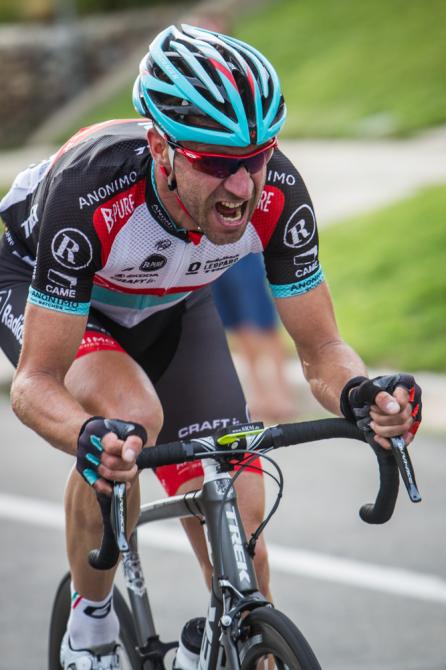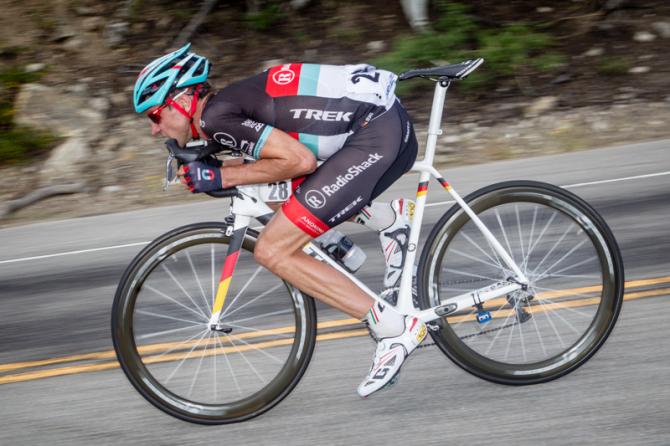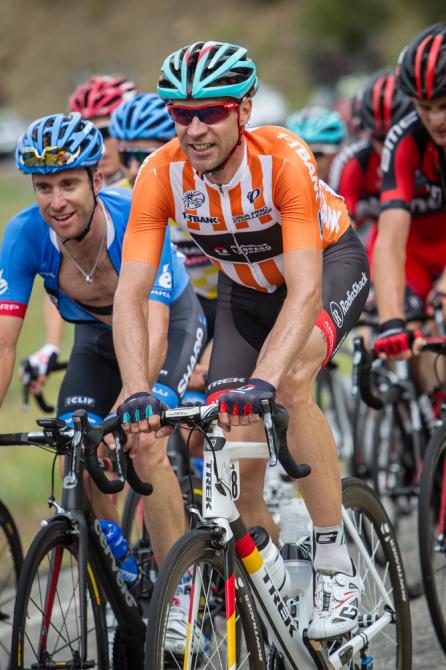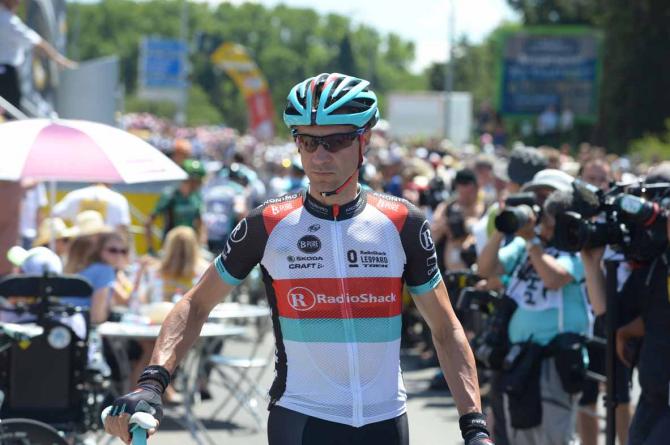Q&A: Jens Voigt on his career, a final season, anti-doping and the 98 Tour samples
Oldest rider in the World Tour still motivated to perform




In the likelihood that 2014 will be his final year within the peloton, Cyclingnews sat down with Trek’s Jens Voigt at his team’s training camp in Benidorm, Spain.
The 42-year-old has been a fixture in the peloton since the late 1990s and seen the sport of cycling go through a number of scandals and transformations during his time at teams such as Gan, CSC and RadioShack. Before one final year of racing, the ever-popular German discussed his plans for the year, Chris Horner, the 1998 Tour de France samples and his relationships with former bosses Bjarne Riis and Johan Bruyneel.
Cyclingnews: So is this perhaps your final team camp of all time?
Jens Voigt: Very probably, yes.
CN: So is the year going to be case of saying ‘this will be the final time I do this race, the final time I do that race’
JV: I’ve just talked to your French colleague about something similar. I still say it’s all probable because I don’t want to get myself too comfortable. If I say it’s my last year then I can say I don’t need to train anymore because I’m not looking for a contract. I don’t want that because I have too many expectations of myself and I don’t want to let myself down. That’s why I keep saying it’s probably my last season, to keep myself under a little bit of pressure. First of all I’m still a cyclist so I’m going to do my job but I will try and go with a more relaxed attitude. I will try and enjoy my first race at the Tour Down Under. Maybe next year I come back with another function in the team or as a tourist, who knows. It’s one last time to soak up the emotions from the fans and just enjoy the best from my job.
CN: What are the factors that will determine if this is your last year? Talk to some pros and they say they just reach a day where something happens and that’s that. Are you waiting for that moment or are there more things to factor in?
Get The Leadout Newsletter
The latest race content, interviews, features, reviews and expert buying guides, direct to your inbox!
JV: There’s a bigger picture. I’m married with six children so I can’t leave it to coincidence. I have a responsibility with my family so I have to develop a plan on how my life after cycling will look like. Where I’m going to work or where my income will come from because contrary to popular belief I’m not a millionaire. I’m not complaining, I’m well off but I have six kids, I live in Germany and pay my taxes. I’m not swimming in money so I can’t live for five years without any work. So I do have to develop a plan for what comes next. Just imagine we go out training tomorrow and I crash on the first roundabout and I break my collarbone. I’m going to say fuck I hate this job, this is a shit job, I want to stop now. But imagine on the other hand I go to Down Under, and on the third or fourth stage I slip into the break and nobody pays attention to me and I win. I then say this is the best job ever and I sign for four more years. I’m not a head person, I’m more of a heart and guts guy. That’s how I race. I don’t have a genius plan and sometimes it just comes into my mind and I just do it. But around the Tour I should make up my mind in what direction my future goes in.
CN: One guy that looks like he might be stopping as he doesn’t have a contract is Chris Horner. What do you make of his situation, in that a Vuelta winner, his age of course, still hasn’t found a deal for 2014?
JV: It’s not a funny story. It’s hard to understand. Just before the camp I sent him a message asking how he was and if he had plans for next year, that we miss him at training camp but I’ve not had an answer yet. It is hard to understand. People have rolled out the red carpet for the Vuelta winners in any other team but he’s my age. Last year he only raced three times, Tirreno, then he was off for five months, came back with Colorado and then won the Vuelta. It’s the greatest comeback story probably in the last decade but I guess people are afraid that he’s getting one year older. If you win a Grand Tour you’re entitled to earn a million bucks. You only have three of them per year so they should be awarded with a nice big contract. Maybe people think at 42 he’s caught in a bad situation. He’s gone from having the worst year in his career to turning it around in the last moment to the best of his career. Then all teams had their budgets done, most places were gone and teams disappeared. That just lowered the price for everyone.
CN: Trek and Luca [Guercilena] did offer him a contract but it wasn’t what Horner was expecting financially.
JV: I don’t think it’s a huge secret that our budget is smaller than other years. I believe they offered him what they thought was fair and right and it was then up to Chris to accept it or not. I think at the time he was in contact with the Alonso team so I believe and can only speculate that he could have got a good contract there. Maybe he closed a few doors. When that didn’t come true he didn’t have that many options left.
CN: Do you think he’s paying for the problems that US cycling has had with the focus from USADA to some degree?
JV: I see this as a possibility but it shouldn’t be like that. That would be like nowadays all Germans are Nazis, all French are like Napoleon, or all Brits are former pirates. That would be stupid, to make him pay. As far as I know he wasn’t involved in any of USADA’s investigations so fair and square I don’t see why he should suffer from it.
CN: What do you make of the era the sport is in? You’ve seen it transform from when you came through the ranks with Gan, Crédit Agricole and CSC. You’ve seen the sport go through so much in the last two decades so where are we now in terms of the fight against doping?
JV: Well we did a lot of testing, more than other sports and we get punished for it. I remember in 2008 the test came in for CERA. Then it was the Olympics and only after public pressure was there a retesting for CERA. The test was there, we used it a month before at the Tour de France. The IOC took the decision to say they didn’t need it but only after public pressure did they come up with that. As I said, in other interviews, if someone is caught it’s not a pleasant event but it makes our sport better and cleaner. The headline could be that cycling is getting cleaner, what are the others doing? But no, it was always like punching us. But as I’ve also said many times we did mistakes and a lot of the ammo you guys shot at us, we delivered. But to close the circle, now it’s the election of Cookson and I also hope that the press gives us the chance to reset and restart at zero, to open a new chapter and we start in a more clean, transparent and truthful future.
CN: We spoke to [Laurens] Ten Dam yesterday and he was saying that he gets frustrated that, for example, during the Tour the focus was on doping in the 1980s or the Armstrong years. So do you think it’s incorrect for us to go back and look at those times?
JV: No, it’s not. You’re just doing investigations and you’re just doing your job. Your job isn’t just about asking about the nice weather here in Spain, it’s also about asking about the whole picture but I would think at one moment it would just be enough. Everyone has asked about 1998 and Lance and at one point everyone is tired about answering the same questions. It’s done now, what are we going to change now?
CN: Do you think riders say that because they don’t want to talk about the past or they feel like they’re in a position where they can’t talk about it?
JV: What do you mean because they were involved in something in the past or because they’re just tired of it?
CN: Both but the first one, primarily.
JV: Then you should make it really clear where you’re pointing with your question there because it’s a difficult question.
CN: Fair enough. It’s a loaded question.
JV: I don’t want to go wrong or be misunderstood. I don’t know. If they think it’s good they can open my samples from 1999 and 2000, 2001, if they think it’s important, feel free. It’s just always the same, what happens ten years, 8 years, ago. Everything that happened after 2006, with Fuentes, that’s bad. If people kept going after that, then that’s bad. And before, I don’t know.
CN: Do you think doping was endemic?
JV: Depends on what you think is endemic. Twenty per cent of the peloton, is it 80 per cent?
CN: If you lined up everyone from the 96 Tour it would be very hard to find someone there who was clean perhaps.
JV: I don’t know. Maybe it was just really crazy times back then and no one followed any rules. No one was going to be caught and everyone thought everyone was doing the same. It was maybe a really bad moment and period. When you come in there as a young guy and you have ten teammates telling you that if you want to ever win anything you have to do this and this. What do you do? You’re maybe twenty years old and ten guys tell you that… it’s just a bad moment but to come back to the present, I think we’ve reached a place or time when things are a lot better.
Quintana second in the Tour, Froome is younger, the world champion too. They were probably twelve years old when this all happened. They were playing on their Gameboy, playing Pokémon. What can they know about it and why should they suffer and face questions? It’s unfair towards them. I’m an older guy, I’ve seen those periods so I understand why you guys ask me as I was an eye witness and I was there. I can understand why you ask and that’s why I try and not to complain too much because I understand your point of view. But for the young kids… Peter Sagan was eight 15 years ago. He could probably hardly read back then.
CN: So what did you make of the fact that the 1998 Tour samples were re-tested? What went through your mind then?
JV: I thought ‘what’s the point?’ because it just makes noise for nothing. It’s well beyond the legal time where it could have consequences. It just makes peoples’ lives difficult. You also have to ask how legal it is. I never knew they kept samples for that long. Where do they keep them, in a garage, in a safe cool area? Who opened them? Why didn’t they notify the riders that the B samples were being opened? I think it was almost pointless. Did you see any changes after that?
CN: Well, I wouldn’t say it was directly linked but an ex-teammate of yours, Stuart O’Grady, retired pretty much off the back of that.
JV: Okay, that’s true. That’s true but I didn’t see and I still don’t see any point in it.
CN: I don’t want to dwell on O’Grady as he’s not here and I know you have a personal relationship with him and have known him for a long time, but you are here, so when you heard they were going to reopen the samples did you have anything to worry about?
JV: No I didn’t even know if I was tested then or not. Fuck it was 15 years ago. I don’t know if was tested or not.
CN: Okay. Regardless of that test (race) did you have anything from that time, from any of those Tours that would come back to concern you?
JV: No. No. I’m in a happy position.
CN: If that’s the case and that’s the truth does it anger you that you were up against so many guys, and so many guys on your team who were doping?
JV: Well I still hope that not everyone was doping. I only managed to win one single race. I guess it was hard then to compete with the others but you only find out about these things now. If you take a short cut in your tax declaration fuck of course you don’t tell anyone because you know you’re doing something wrong. The less people know the safer your secret.
CN: But if you’re in the same club doing the same thing with your taxes then it becomes easier to talk about.
JV: Do you think? That people would do that?
CN: Well I think we know about it. You have doping on the Postal bus, the Festina bus, nearly any bus from then.
JV: Yes, but I could never understand how they would do that. How they could do something dangerous for your health and breaking the rules.
CN: I remember talking to you two years ago, just as the USADA case was coming out with Bruyneel and you gave the impression that you couldn’t answer some questions because he was your boss and you can’t go around saying this or that. Have you been in positions where there are questions you can’t answer in the way that you’d like because of the reality of the sport you work in?
JV: I hope that in most of my career I said what I think but of course in any environment there are certain words or things you shouldn’t say. Look at things now. If my boss is sitting over there do you think I should say he’s a bad manager? I just couldn’t. Or imagine if you think your boss is a terrible writer. Can you say it? No you can’t because you still want to be paid by the end of the month. There are always situations where you have to find a compromise on how much you want to give and what you want to keep to yourself. You’ve got to find the balance there in trying to say what you want to say but at the same time not totally exposing yourself and getting shot in the back a day after. Does that make sense?
CN: Yes. You’re essentially in a position where you’re looking after number one to certain a degree. There’s only a certain shelf life an athlete has in their career and if look at some examples, for example someone like Bassons or Simeoni, they rode in the same era as you. Bassons rode clean and you’ve implied the same but he spoke in a different way.
JV: I guess. You look at those examples and as I said you have to look for your balance. Okay if I say whatever I want without looking at the consequences but I risk being on the outside or I say a milder version of what I think and then I stay inside. Looking out for number one sounds easy and selfish but I have a family and children so I can’t act like a renegade or a rebel all the time. I’m having a life, I have to pay taxes, my insurance, my phone bill, school, the kids. I just can’t do whatever I want. It’s the same with training. There are times when I don’t want to train all week but I have that responsibility for my family.
CN: With all due respect if you had gone down the path of Bassons it would perhaps be fair to say that you wouldn’t have ridden for some of the team managers that you have ridden for.
JV: Be more precise with that.
CN: Okay so you may have ridden for Roger Legay but maybe not for Riis, maybe not for Johan Bruyneel.
JV: Well my friend now you’re making me mad and angry. You’re a journalist right?
CN: Yes.
JV: Do you know anyone called Murdoch? Was he your friend? Have you ever worked with him? Do you feel dirty working in the same business as Murdorch and all this illegal tapping of phone lines? How do you feel about that? Answer the question please.
CN: Well there’s difference.
JV: Is there?
CN: Yes.
JV: Well not for me. I’m asking you a straight and fair question. Answer the question. Are you a colleague of Murdoch? What do you think about that?
CN: No. I’m not a colleague of Murdoch or an employee of his or work for any publication associated with him.
JV: Okay. See it’s easy to throw out any accusations. Bjarne and me, I would fucking put a lie detector right here and say that for not a split second did he ever mention something like ‘Jens do you need some help?’ Not for a split second did we talk about it. I’m not an idiot and now I know, but why should I not ride for him or sign for him. There was nothing against him to say that back in 2003. There was nothing to say against him. I try to judge people by my own and try to have my own opinion about people. I had seven fantastic years with Bjarne and I wouldn’t say a bad word about Bjarne. I would sign again with him. The way I was concerned he was always correct. My salary always came every month. We had arguments about races, that’s normal, but when I finally told him about this Luxembourg project we hugged each other and wished each other luck.
CN: And I wasn’t casting anything over the relationship you had with him on a personal level, it’s just that the reality is that we now know how people were seen in 2001 is different to how they’re seen now.
JV: I don’t know. You’re from Great Britain, right?
CN: I live there.
JV: So you know the News of The World. Do you read it? Do you feel guilty about it?
CN: It’s not the same thing.
JV: That’s an easy excuse. I would write in my column tomorrow that you refused to answer my question. How do you feel about that?
CN: Okay. What’s the question?
JV: I’m just trying to point to out that it’s easy that we know everything now and why didn’t you do this and that.
CN: You’re right if what you’re saying is that nothing is black and white. I agree on that. I’m not evading the question.
JV: You’re trying to dodge the question.
CN: No. I gave you a straight answer earlier that I don’t work with Murdoch.
JV: As I said I had a good relationship with Bjarne. He respected me and I had a good attitude. I respected him for his point of view in life, how he challenged me to be a better rider and we both worked in a way that made us better. I remember when I had my bad crash in the Tour I needed another surgery and the day before the operation was the day before his wedding. He called me and said don’t worry, have the operation, do you rehab and we’ll have a contract for you next year. You have my word you have a contract. He was good to me.
CN: You’re not the first rider to have good word for Bjarne. A lot of riders would say the same thing, that they have respect for him and that he got the best out of him.
JV: The merger when Johan came. Do you think that someone came and asked me? Do you think someone would come and ask you if you were going to be sold to The Times?
CN: Then I would be working for Murdoch.
JV: [Laughter] Exactly. I’m just a rider and I was 41 at the time. There’s not many teams that would take a rider at 41 so there we are again with the whether you should open your mouth question. If you just firing off then you might be out of the job. The merger became known to the public during Colorado so you have a month and half to find a contract at my age. I didn’t have an ongoing contract with the team. I was also curious. I thought maybe Johan would bring something different to the team. He had a different way of running things which in the end didn’t work out the way we wanted to, but I was curious. He does have some experience in cycling and I thought maybe he can make the Schlecks win the Tour.
CN: Finally, as we’ve been asked to wrap things up, let's assume this is your final year as a rider how do you want people to sum up your career once it's finished?
JV: I think the way I want to be remembered is that people say I was a loyal, hard working rider, who always had a smile and if I’m really asking for a lot then I hope one or two people say that I inspired them. To get up after a crash, to get up after a bad result, or to get up after a mishap in life and to bounce back from it. Hopefully people thought that if Jens can do it maybe I can do it as well. Something like that.
Daniel Benson was the Editor in Chief at Cyclingnews.com between 2008 and 2022. Based in the UK, he joined the Cyclingnews team in 2008 as the site's first UK-based Managing Editor. In that time, he reported on over a dozen editions of the Tour de France, several World Championships, the Tour Down Under, Spring Classics, and the London 2012 Olympic Games. With the help of the excellent editorial team, he ran the coverage on Cyclingnews and has interviewed leading figures in the sport including UCI Presidents and Tour de France winners.
